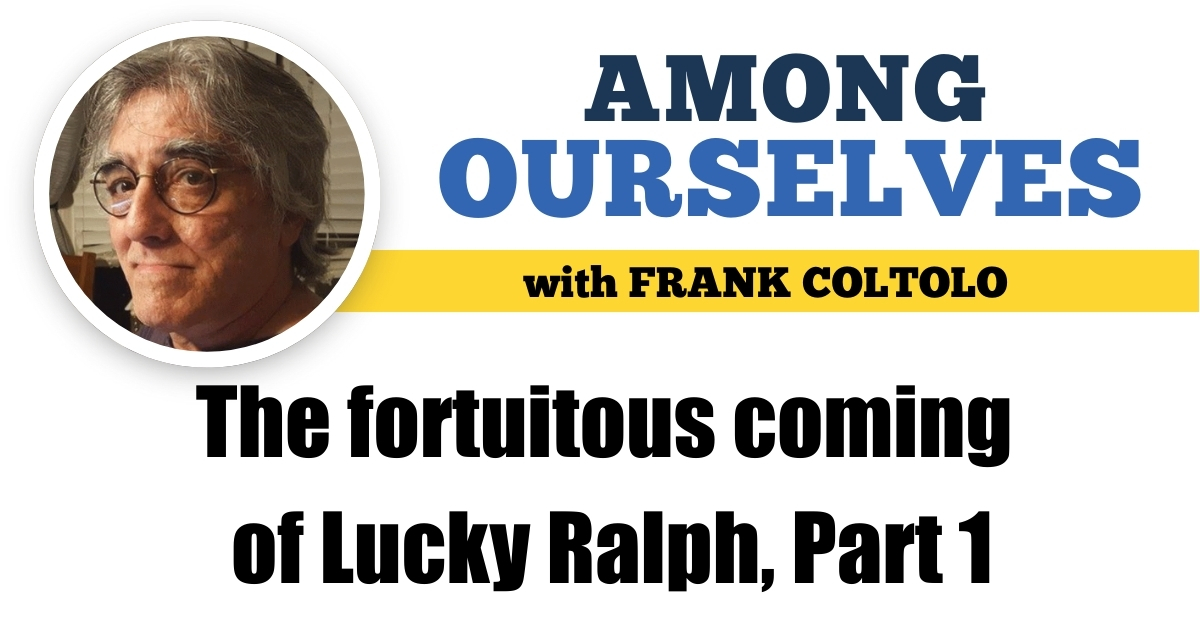The fortuitous coming of Lucky Ralph, Part 1
by Frank Cotolo
Once upon a time in the late ’70s there was only one time each year that harness racing was unavailable in the California southland: when the sport was available exclusively in the state capital. The entire west coast standardbred community competed in a meet on the one-mile Sacramento State Fair racetrack known as Cal-Expo.
Since those were the days before off-track and on-line betting there was only one way to contribute to pari-mutuel wagering: go to a track. No one I knew ever drove 768 miles round trip for a day at the harness races. If a player was unable to survive a severe attack of wagering-on-harness withdrawal there was only one solution, take the betting greenbacks to the local thoroughbred tracks: Hollywood Park or Santa Anita.
Me? If I was not on the road with The Wolfman or involved in a weekend movie shoot or meeting some romantic promise I could easily be found on Saturdays and/or Sundays at one of the thoroughbred tracks.
And on some day back then this happened:
A young boy about 9 years old sat on a seat in the grandstands of Hollywood Park on a cool Sunday afternoon. He swung his legs from the knees down back and forth and chewed a wad of gum he blew into large bubbles that cracked while he gazed vacantly at the ducks swimming in the pond surrounded by the dirt and turf courses.
His father — a man about 50 or so — sat next to him with restless energy; flipping pages of the Daily Racing Form and squinting to read the small print of past performance lines.
The dad said, “What a rider change on Wizard King. This horse got good workouts last week. Jeez, he’s got some speed on the turf, too. At Santa Anita he smoked in a downhill sprint and almost won. Looks ready to win here today.”
Without warning the kid turned around and while still gnawing on his gum said, “No way the six horse doesn’t crush this field. Cheap bunch of claimers. You could ride the six and win, pop.”
The scene caught my attention because it was the juxtaposition of every story told to me about how someone became interested in horseracing, when the dad was the handicapping guru. In the common tale, a dad took their son to the racetrack where he bet on every race. He bought his son ice cream and soda. And dad spoke freely (even with horseplayer slang, as if his son knew anything about what was happening). Dad always appeared confident about making money betting and presented great excuses disguised as perfect reasons why he lost money now and then, too.
That was not my dad and me.
The origins of my first experiences in the pari-mutuel arenas had nothing to do with the man who sired me. Ralph Cotolo’s opinion of those ensconced in horse racing and gambling was that of a dunderhead. It was not earned. It was inherited due to second- third-and-more handed down stories about the imprudent victims of gambling.
Indulge me to fully appreciate the value of my relationship with Ralph. He bore a remarkable resemblance to Jackie Gleason’s sad sack character Ralph Kramden (also a resident of Brooklyn, NY) in The Honeymooners TV sitcom. My Ralph was an overweight plumber; a profession awarded him by his dad (my namesake) who in the early 1900s co-founded New York’s Plumbers Local 1.
Ralph was not only a Ralph Kramden tribute character in sight but he was also one in sound. My dad could explode as quickly and as unexpected and almost as loud as a handheld pager. He also resembled actor Lenny Montana portraying Luca Brasi in The Godfather. (Oddly enough my dad was an extra in the film’s funeral scene and even odder the scene takes place close to where my dad was buried eight years later.) He also made trivia history appearing in the background crowd of a photo inset included in The Beatles’ Magical Mystery Tour album. (Though that has been challenged it adds to the widely spread legend of the stocky plumber from Brooklyn).
Ralph exploded when he discovered his 20-something son won a $200 plus harness racing exacta after visiting a neighborhood Brooklyn Off Track Betting (OTB) parlor.
“What did I tell you about that stuff?” he shouted.
“It only cost two bucks,” I said.
“Two bucks two shmucks. Don’t start with that stuff. You know what happened to Cheech.”
There was no debating available to defend me. In Ralph’s head I was one bet away from being beaten to a pulp by local gangsters threatening worse injuries if I did not pay the thousands of dollars I owed from losing bets. He screamed his case. I cowered as always when he blew a gasket but this time, I knew I had to gamble on a rational approach to his disdain.

















